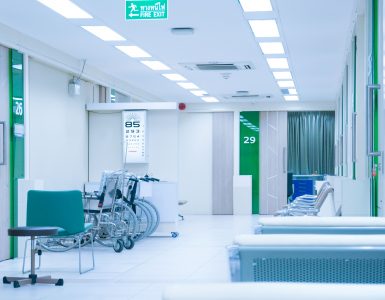In our previous essay, we introduced the complex topic of relying upon the view of medical professionals in questions of Halacha. We reviewed the Sugya in Maseches Nida from which several Poskim adduce proof to the credibility of medical professionals in Halachic matters, and explored the Sugya of a “Ro’ah Machmas Tashmish” – a woman who experiences post-coital bleeding.
This essay will examine the following questions:
- What is the basis for the Halachic credibility of medical professionals?
- Why do some Poskim disagree?
- To which type of medical professional(s) do we refer?
The Mishna in Yoma states (8:5):
[If] a pregnant woman smells food [on Yom Kippur], we feed her until her soul is restored. A sick person [is fed] based on (the advice of) experts, and, if there are no experts present, we feed him based on his own assessment, until he says, “it is enough”.
To which “experts” does the Mishna refer? The Bartenura explains: “Physicians, expert in their profession”.
This Halacha is codified by the Shulchan Aruch (O.C. 618:1) – we rely on the recommendation of physicians (including non-Jewish ones) as to whether a sick person can fast on Yom Kippur. In fact, even those Poskim who do not agree that physicians should be relied upon in matters of Halacha, agree in this case given that it is a matter of Pikuach Nefesh. Since even a Safek Pikuach Nefesh overrides all of the Mitzvos, we take a physician’s warning into account, for even if we don’t rely entirely upon his opinion, we certainly give it enough weight to raise a Safek.
With that said, there is one reservation raised by the Tiferes Yisrael:
“Even a non-Jewish doctor, if he says that if the patient fasts he may be endangered – we feed him.” L’Aniyus Da’ati, today one should consider this matter more carefully. I have personally witnessed how physicians have lost their reliability, for with regard to every slight malady they always say that if the patient fasts he will be endangered.
Perhaps the Tiferes Yisrael assumed that the reason that physicians would say that a patient will be endangered due to fasting even if they suffer from only a “slight malady” is because they do not appreciate the importance of fasting on Yom Kippur.
The Tiferes Yisrael referred to non-Jewish physicians – even expert ones – however, the Biur Halacha (328) extends the argument to include certain Jewish physicians as well. The Shulchan Aruch (ibid. 10) rules:
Any illness that physicians say is a Sakana, though it may be only be a superficial wound, we desecrate Shabbos on its account. If one physician says it is necessary [to desecrate Shabbos] but another physician says it is not, we desecrate Shabbos. Some say that we do not need [the opinion of] an expert physician because everyone is considered somewhat expert, and in any matter of life-and-death we are lenient.
The Rema adds:
Some say this is only true of Jewish people. But an ordinary non-Jewish person who is not a physician – we do not assume him to be knowledgeable (Isur v’Heter heAruch).
These rulings are fascinating. Essentially, the Shulchan Aruch rules that the determination as to whether an illness is a matter of Sakana (even if it is not one of the illnesses identified by Chaza”l) should be made by physicians. However, since Shabbos is overridden even due to Safek Pikuach Nefesh, we do not need the input of an expert physician. In fact, every person can be considered “somewhat expert” if he says that he has some knowledge of the condition and believes it to be a Sakana (for even laymen occasionally have some medical knowledge).
However, the Rema cites the Isur v’Heter who ruled that this does not apply to non-Jews. The Mishna Berura explains that the reason even a layman is believed if he is Jewish is that “since he is commanded to observe Shabbos and [nevertheless] says that it should be desecrated, we should certainly rely upon his recommendation.” This does not apply to a non-Jew, to whom Shabbos has no significance.
We will return to this idea shortly, but first we will return to the comments of the Tiferes Yisrael, quoted above. The Biur Halacha cites the Tiferes Yisrael and adds:
The Shu”t Ramat”z[1] writes similarly (O.C. 39:10). Similarly, the Shu”t Ruach Chaim rules (551:4) with regard to Jewish physicians that many are suspected of violating the Torah and of desecrating Shabbos, and of refraining from fasting due to Apikorsus. It therefore requires a great deal of consideration as to whether one may rely upon their recommendation (see there). Ultimately it depends on the Posek’s judgement, as stated by the Mateh Ephraim 418:2.
In other words, the reason to be wary of a physician’s recommendation is not due to his lack of medical expertise but due to his possible lack of regard for Halachic matters. This may lead him to misrepresent a patient’s condition, or to refrain from investigating carefully, either wittingly or unwittingly. The Biur Halacha therefore recommends that a Posek have sufficient familiarity with the issues so that he can carefully consider the physician’s recommendation.
(We should stress this is not a concern for apathy or malice on the physician’s part. If anything the opposite is true. Physicians are expected and charged with the responsibility to direct their patients to avoid Sakana to the greatest possible degree.[2] While this is certainly correct from the medical standpoint, if the physician would appreciate the importance and gravity of Yom Kippur, he would engage in a more intensive determination of whether fasting would pose an actual danger to his patient.)
We should add that this consideration applies to all of Hilchos Isur v’Heter; a person cannot be relied upon in matters of Halacha if he has no regard for the Mitzvos about which he offers an opinion. For example, one cannot rely upon a person who says a food is Kosher when he does not observe the laws of Kashrus himself.
The reason that many Poskim nevertheless rely upon the view of non-Jewish or non-observant physicians could be due to one or both of the following Halachic principles:
- Since the physicians are professionals, we can assume that when we ask for a professional opinion, we will get an accurate and objective recommendation. This assumption is based on the principle of “Uman Lo Mara Umnusei” – a professional person is careful not to undermine his credibility.
- If a matter is destined to be exposed people are careful not to lie. This is known as “Milsa d’Avida l’Iglu’ei”.
However, in light of the specific concerns when it comes to physicians, as described above, either or both of these two principles may not be sufficient. A doctor who tells a heart patient to refrain from fasting even though it would not be a true risk of Sakana will not later be considered to have exhibited professional negligence or to be a liar. At most, he will be viewed as having been overly conservative and his credibility will not be harmed. In addition, there is no act of negligence or deceit that is destined to be revealed that would deter him from advancing this opinion in the first place.
It is more logical, as explained by HaGaon Rav Asher Weiss Shlit”a, that the faith placed in physicians’ recommendations in matters pertaining to Halacha is not due to universal arguments that apply to all professions, but to two specific arguments that apply to physicians.
First, the principle, “A physician is granted to right to heal” is not only a license to practice medicine, but an obligation and important Mitzva. This includes the mandate to perform a complex, life-saving surgery even if there is a risk that the patient will not survive. Moreover, the one to decide whether to perform the surgery is not the Sanhedrin but the physician. Within his realm of responsibility, the Torah grants a physician credibility; we rely on his judgement. (This is why Halacha is more lenient with regard to mistakes made by physicians than those working in other professions.) For this reason, Halacha recognizes physicians’ recommendations and decisions, obviously when all relevant factors have been properly considered.
Second, we find that “Ne’emanus” is granted to a person when there is no one else who could possibly offer an opinion. For example, the Gemara in Kiddushin states that a midwife is believed to say which child in a set of twins was born first (73b). In Shu”t Minchas Asher 2:13, Rav Weiss Shlit”a cites five Rishonim who explain that the midwife’s Ne’emanus is due to the fact that there was no one else present at the birth and she is therefore the sole individual capable of making this declaration.
The same concept can be applied to physicians. Since they are the only ones who have studied medicine and therefore are the sole individuals with the ability to diagnose medical conditions and offer precise recommendations, we must rely upon their opinions.
For this reason, the Poskim (including the Mishna Berura cited above) recommend that a Posek develop adequate medical knowledge to be able to [somewhat] independently confirm the patient’s diagnosis and to be sufficiently informed so that he will not have to follow physicians’ recommendations blindly. Since their Ne’emanus is partly due to the fact that “we have no other option than to rely upon them”, as explained above, it is incumbent upon Poskim to understand the topic themselves to the degree possible.
[1] R’ Meir Tzvi Weitmeir, appointed Av Beis Din of Sambor in 1825. The Shu”t were published in 1872.
[2] For example, if a heart patient asks his physician whether he should fast on Yom Kippur, the physician is likely to say: “Why should I take even the slightest risk? It is better not to fast.”













